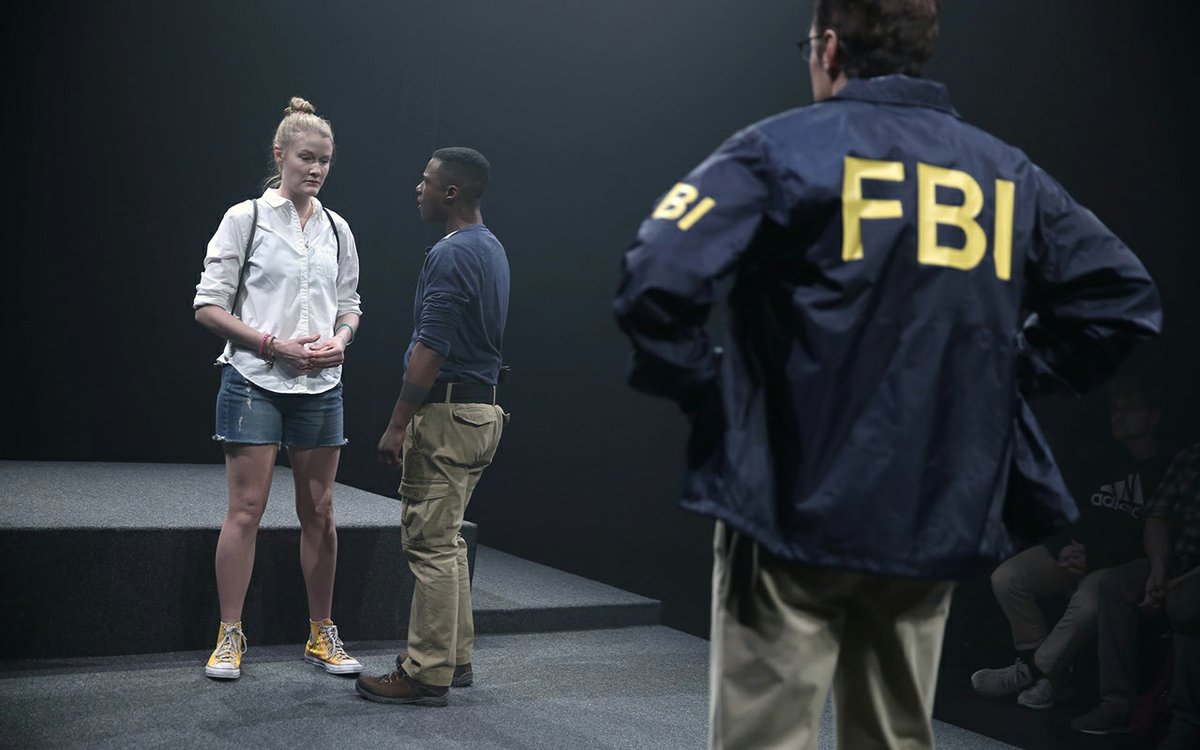“Is This a Room” Puts Reality Winner on Stage
While I wasn’t sure what to expect from a show revolving around a transcript of a federal interrogation, I discovered that there’s nothing like seeing real life recreated before your eyes. Is This A Room: Reality Winner Verbatim Transcription, presented by Tina Satter and Half Straddle at the Walker, creates an atmosphere of increasing tension and escalating panic.
As its title suggests, the show recreates the transcript of the interview of Reality Winner by two FBI agents, with a third agent mostly standing by. Winner is the former intelligence specialist and whistleblower from 2017 who released a copy of an NSA report about Russian cyberattacks on a company that provides voting software and U.S. election officials days before the 2016 election. It was definitive information from the government stating Russian intelligence interfered with the election. It was also a top secret, classified report, that Winner thought the public had the right to know.
Soon after she mailed the document to journalists at The Intercept, FBI agents came to Winner’s home, questioned her, searched her living space, and arrested her. Charged with the Espionage Act, she is now serving a 63-month sentence.
The minimal production allowed the focus to be held on the dialogue and expressiveness of the actors. With nothing but a gray platform as the set, the ambient sound and lighting cues create a sterile atmosphere of dread. To signal how the transcript is heavily redacted in parts, the lighting blacks out and flares pink in spots where the lack of information appears in the document, accompanied by a thudding sound effect. As the redactions thicken, the audience reckons with the discombobulating feeling of quite literally being in the dark without certain details.
I have to admit, I jumped after the first blackout, once Winner admits to sending the NSA document to reporters. I was so engrossed in the interrogation, and it came so suddenly, that I was physically shocked. At one point there are several redacted moments in a row, where the lights blink and the actors adjust their posture between the darkness, emphasizing the unknown moments from the interview.
The actors each embody their characters so fully, with the mannerisms, speech patterns, and inflections appearing intentional and natural. Emily Davis, who plays Reality Winner, portrays her voice with a Southwestern accent, nervous inflection, and thick emotion. As the conversation escalates, Davis’s eyes tear up before spilling out in a rush of emotion when her fate becomes sealed.
"All I'm saying is I-I know, uhm, what I did, and so. At that point, I'm not thinking about myself anymore," Winner says of why she chose to leak the documents. I felt a deep sense of empathy watching the struggle of a woman so frustrated with the state of the world, she had to act in the only way she could.
The actors who play the three agents eerily replicate the interrogation techniques of the encounter. They vigorously question Winner, at times physically closing in on her, and then back off and make pseudo-small talk within the same breath to control the situation and get her to confess.
As I was watching, I felt the blatant intimidation of having three armed men surround a female with ulterior motives. It was shocking to see the demonstration of FBI interrogation tactics on display, and I walked away feeling somewhat nauseous. There were moments where it was revealed that the search warrant wasn’t even there yet and instead was “en route,” and the agents would repeat the statement that the situation was all “voluntary,” although that couldn’t have felt further from the truth.
In the transcript there are moments that, when reenacted, are absurdly funny, reflecting the awkwardness of an FBI interview with Winner's sardonic humor and sharp wit. But the other moments of humor were undoubtedly uncomfortable, like the type of jokes you make to break tension, or the types of comments special agents make to build a sense of rapport before asking the tough questions.
In one scene, Becca Blackwell’s FBI character enters and asks, “Is this a room? Is that a room?” While the play is intimate and the set of her house barebones, Winner's actions reverberated throughout the globe. She is serving the longest sentence ever imposed for the unauthorized release of classified information to the media, which brings with it a chilling effect for potential leakers in the future. How much classified information exists that Americans have a right to know, that the public will never learn?
The realness of the interrogation is apparent through the overlapping dialogue, hemming and hawing, start-stops, and imperfectly structured sentences. At a time when so much is filtered and edited to perfection, it was refreshing to experience a work so raw. Sometimes the truth is stranger than fiction.
Performances of "Is This a Room: Reality Winner Verbatim Transcription" continue January 10-11. Tickets are $26. Walker Art Center, 725 Vineland Pl., Mpls., 612-375-7600, walkerart.org








Gloss